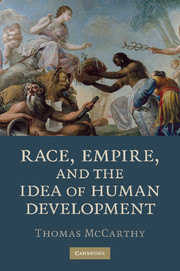Book contents
- Frontmatter
- Contents
- Acknowledgments
- Introduction
- Part One
- 1 Political philosophy and racial injustice: a preliminary note on methodology
- 2 Kant on race and development
- 3 Social Darwinism and white supremacy
- 4 Coming to terms with the past: on the politics of the memory of slavery
- Part Two
- Conclusion: the presence of the past
- Index
- References
1 - Political philosophy and racial injustice: a preliminary note on methodology
Published online by Cambridge University Press: 05 June 2012
- Frontmatter
- Contents
- Acknowledgments
- Introduction
- Part One
- 1 Political philosophy and racial injustice: a preliminary note on methodology
- 2 Kant on race and development
- 3 Social Darwinism and white supremacy
- 4 Coming to terms with the past: on the politics of the memory of slavery
- Part Two
- Conclusion: the presence of the past
- Index
- References
Summary
In mainstream political philosophy, the history of European racism, with its vast implications for the theory and practice of modern liberalism, has long remained on the margins. This is nearly as astonishing as the theoretical marginality of gender until rather recently. I say “nearly,” because while gender relations have deeply structured every human society, race relations, in the sense at issue here, have had major structural significance “only” for some five centuries. That is to say, they are contemporaneous with, and deeply implicated with, Western modernity from the first voyages of “discovery” to present-day neocolonialism. If one asked, in Rawlsian terms, which morally arbitrary facts about individuals and groups have had the greatest consequences for their legal and political standing in the modern world, gender and ascribed race would certainly be near the top of the list, along with class, though their comparative significance would vary from context to context. If the context were the global one of European expansionism since the fifteenth century, then racial classification would have a strong claim to being the most significant; for a central ingredient in the process by which more than three-fourths of the globe came to be under European and/or American rule before the start of World War I was the practice and theory of white supremacy.
Linking Western modernity to the conquest and exploitation of the non-Western world is a familiar form of critique.
- Type
- Chapter
- Information
- Race, Empire, and the Idea of Human Development , pp. 23 - 41Publisher: Cambridge University PressPrint publication year: 2009



